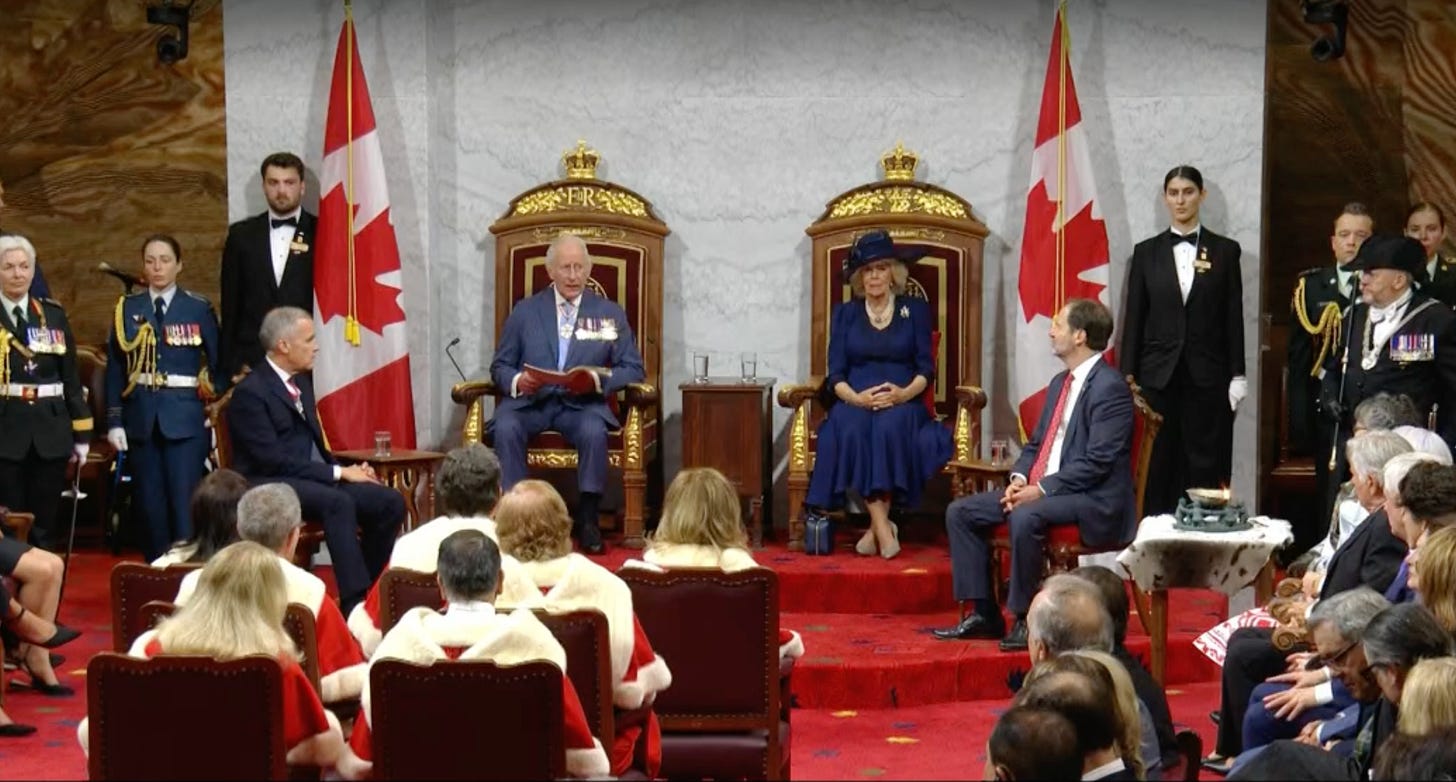Canada's Royal Visit is embarrassing
Facing a sudden identity crisis, Canada's liberal elites retreat to an older imperial nostalgia
Just days after Mark Carney was sworn in as Canada’s prime minister back in March, he flew to France and Britain for meetings with Emmanuel Macron and Keir Starmer. In context, the intended symbolism of these chosen destinations was subtle but obvious: amid Donald Trump’s trade war and intermittent annexationist threats, Carney was leaning into an older, less Americanized strand of Canadian nationalism.
This week, however, any subtlety in the posture of Carney’s government has disappeared. If you live elsewhere and haven’t heard the news (or been bombarded with it by every news station in the country, as has been the case these past few days), the Throne Speech to mark the opening of Canada’s new Parliament was today delivered by King Charles II.
In many ways, the whole thing is very much in keeping with the performative sobriety at the heart of Carney’s political brand. He is a technocrat who, much like the royals, prefers to view himself as above, and separate from, the democratic crassness of modern politics.
But there is a clear geopolitical subtext to the Charles and Camilla visit as well, as Canadian culture recoils at the belligerent posture of Trumpism and Canada’s government scrambles for an alternative to the country’s longstanding partnership with the United States. Having put all of their proverbial chips — diplomatic, economic, and otherwise — on the American empire for decades, the aim is evidently to reorient by appealing to an older, alternatively imperial strain of the Canadian identity.
The paradoxical absurdity of this symbolism here is aptly, if unintentionally, summed up in this instructive passage from one CBC News report:
“The King's visit, which is happening at Prime Minister Mark Carney's request, is a chance to assert Canada's sovereignty by nodding to the country's longstanding ties to the Crown in the wake of Trump's 51st state taunts.”
In effect, then, the aim of this royal pageantry is to assert Canadian independence by reminding the world that the country’s official head of state is a king who resides somewhere else. I say “reminds” because the monarchy has largely ceased to be a living part of Canada’s civic and cultural identity. There are certainly still monarchists around (and some of the most embarrassing ones happen to occupy perches in the Canadian media) but the monarchy itself is, for all intents and purposes, something few really care to think about, let alone celebrate.
Here’s a bit more on that from a Jacobin piece I wrote in the wake of Elizabeth II’s death in 2023:
Despite much officially sanctioned mourning, most Canadians reacted to the death of Queen Elizabeth II with ambivalence. Muted as this response may have been, its emotional scale dwarfed anything elicited by the coronation of Charles III. Today, the British monarchy is a withered husk, the stuff of middlebrow Netflix dramas and condemnatory exposés featuring its own former members. The jig is up, even if the institution officially remains, and whatever legitimacy the institution may have once enjoyed is palpably a thing of the past.
Even before the death of the queen, Canadians’ bond with their formal head of state was less than intimate. Polled by the Dominion Institute in 2009, a full three-quarters didn’t even realize the title belonged to her to begin with, a clear reflection of the monarchy’s effective nonexistence in Canadian civic life. Over the past decade or so, public support for the maintenance of ties has waned still further, and the latest data suggests no slowing of the trend. On the eve of Charles’ coronation, a survey from the Angus Reid Institute found that a mere 28 percent of Canadians have a favorable view of him, while a full 60 percent don’t want to recognize him as king. Just over half, meanwhile, don’t want their country to remain a constitutional monarchy.
Viewed this way, there is something charmingly twee about the Carney government’s desire to inaugurate the latest session of Parliament with a royal visit. Ultimately, I think the whole thing bespeaks a cloying provincialism at the heart of Canada’s liberal political elite. To those at the helm of one of the world’s most successful and multicultural democracies, the idea of responding to Trump by asserting actual independence apparently remains inconceivable — as does embracing a more confident national identity that isn’t premised on some kind of subordinate status (whether to Washington or the British Crown).
As a Canadian — who happens to have, it’s probably worth saying, deep personal and familial ties to Britain — I find the whole thing embarrassing. I think Quebec legislators and Indigenous lawmakers (like the Ontario NDP’s Sol Mamakwa) who choose to opt out regal ceremonies have the right idea. Canada has a parliamentary system and constitutional order with British roots, and the nature and meaning of its national identity will inevitably be debated and contested. The notion that identity should draw on the feudal liturgies of the British gentry in the year 2025, however, is absurd on its face.
Regardless, any attempt to renew or reorient Canadian nationalism this way is destined to fail. Alternatively, we could try acting like the modern, cosmopolitan society we already are instead.


